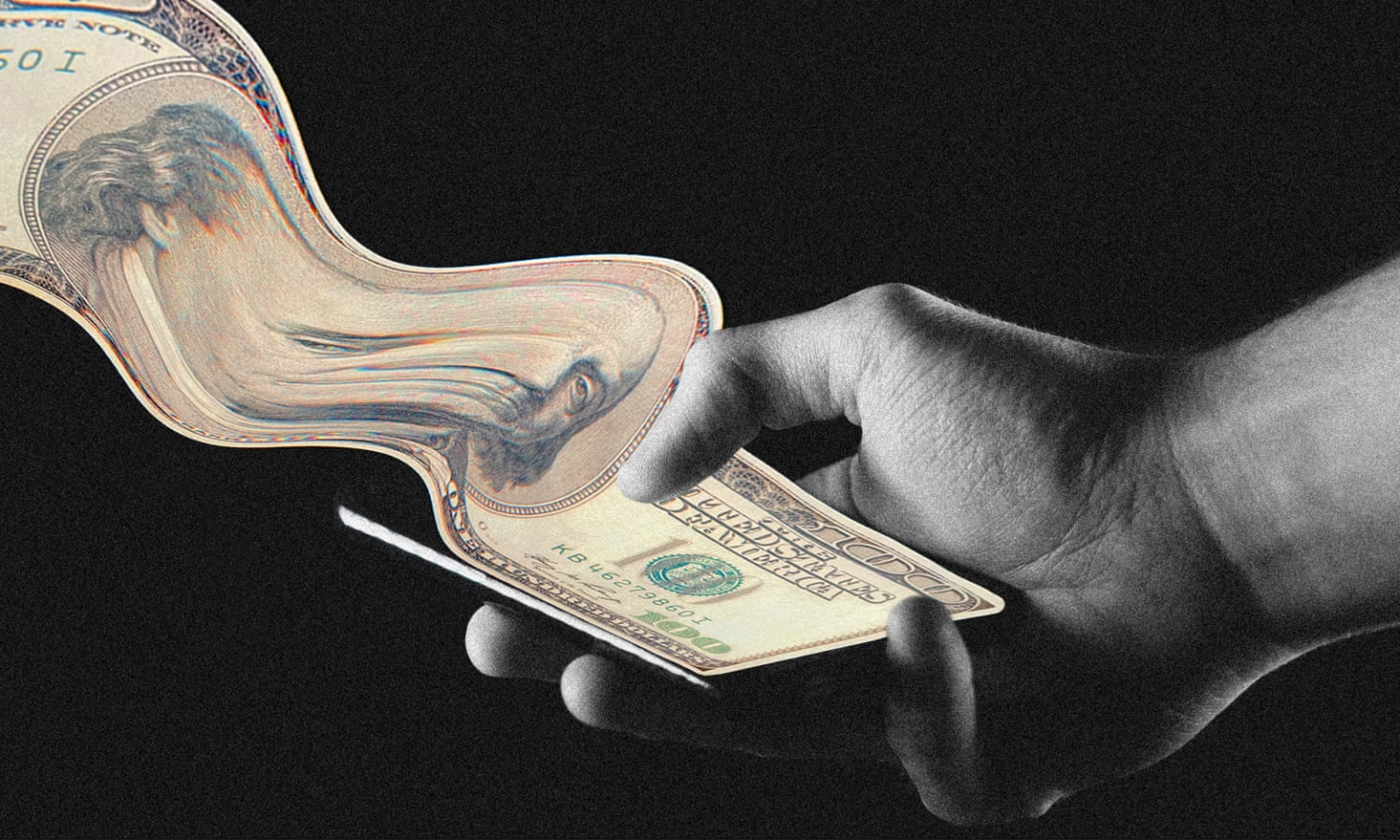‘We’re killing the youth of America’: calls grow for crackdown on US gambling
Worries that gambling addiction has spiked in the US as legal sports betting booms have led to calls for increased regulation
Callum Jones in New York
Fri 1 Dec 2023 06.00 EST

Gambling helplines are reporting record levels of calls. Illustration: Guardian Design/Getty Images
The United States is heading into a “quagmire, if not crisis” of gambling addiction among young people, according to counselors and clinicians – prompting calls for a regulatory crackdown.
Treatment clinics are grappling with an influx of patients in their teens and early 20s and helplines are reporting record levels of calls.
“There’s a lot of kids that are gambling,” said Felicia Grondin, executive director of the Council on Compulsive Gambling of New Jersey.
Ironically, New Jersey was the state that led the charge for the legalization of sports betting and, in 2018, successfully convinced the supreme court to overturn a decades-old federal law that prohibited the state from legalizing sports betting.
Requests for support through New Jersey’s helpline more than doubled over the ensuing years, as the legal market ballooned. Hundreds of calls from concerned relatives each year have heightened fears in the state that problem gambling is sweeping through a new generation. It is not unique.
“Calls to gambling helplines in most states in America are up, by sheer numbers,” said Timothy Fong, co-director of the gambling studies program at UCLA. “More and more younger clients” – aged 25 and under – are seeking treatment, he added.
Arnie Wexler, a counselor, has not seen anything like this before. “We’re killing the youth of America. It’s gotten crazy. Nobody cares,” he said.
Gambling gets younger
Placing a bet in the US has never been easier. Access to legal gambling, once confined to casinos and racetracks, now sits in millions of pockets across the country. Smartphones “made all avenues available to all people”, said Brad Ruderman, of the Beit T’Shuvah treatment center in Los Angeles, California. “This is the first generation where this is normal.”While you are required to be 21 to bet on sports in most states in which it is legal, or 18 to take part in fantasy contests in much of the US, underage activity is a cause of mounting unease. When Keith Whyte, executive director at the National Council on Problem Gambling, asked a room of 40 17-year-old boys in Virginia earlier this year how many had a sports betting app on their phone, 36 hands rose.
The US is now headed into more of a gambling addiction quagmire, if not crisis
Gambling is “getting to be a younger activity”, Ruderman observed. As brains do not typically finish developing until people reach their mid-20s, those placing bets before this point cannot fully process the associated risks, he said. “They’re very susceptible to dopamine, endorphin rushes.”
The Algamus treatment facility in Goodyear, Arizona, has seen a “very significant increase” in patients under 30 who ran into trouble wagering on sports. “It’s picking up steam as more states legalize,” Rick Benson, its founder, said.
Three decades ago, when Benson was betting, it was only possible between certain hours. The last race of each day was his final opportunity to place a wager at the track before the next afternoon. Today, it’s available around the clock.
The US is “headed into more of a gambling addiction quagmire, if not crisis”, in Benson’s view. “I think there’s no doubt about it.”
Shekhar Saxena, former director of the World Health Organization’s mental health unit, said younger people are more likely to indulge in gambling – and operators across the world lean on a mix of both peer and commercial pressure to attract them.
“We know that young people like to experiment more,” he said. “We also know that young people are much more in touch with, and influenced by, their peers. And we also know that […] because of their development stage, their resilience, and the possibility to control their behavior, is a little bit less.”
Asking for help
The 2018 supreme court ruling changed the game for gambling across the US, leaving it to states to decide whether to legalize sports betting. New Jersey – which had spent six years fighting for this right – did so weeks later.“We’ve seen a dramatic increase since sports gambling was legalized,” said Grondin, who leads its compulsive gambling council. There have been consequences. Traffic to its helpline is “just growing and growing”, she said.
“Youth gambling is definitely on the rise,” added Grondin. “We’re getting more and more calls associated with that.”
In 2018, 11.5% of people who contacted New Jersey’s gambling support service and disclosed an age provided one under 25. During the first 10 months of 2023, this bracket accounted for 19.6% of calls, texts or chat messages in which an age was disclosed.
As it became more troubled about the prevalence of gambling issues among young people, the council recently launched a preventive schools program designed to reduce risks among children.
Fong, at UCLA, described a clear surge in problem gambling cases, but added another reason for more young people calling helplines and seeking treatment: that this generation is “more likely to reach out” on such issues than its predecessors. “There’s greater acceptance of gambling, there’s greater acceptance of treatment for gambling, there’s more acceptance of asking for help,” he said.
States urged to take action
Lobbyists fighting for each state to legalize online sports betting put one fact at the heart of many of their campaigns: it’s happening anyway. Tens of billions of dollars are already being wagered illegally each year, they claim.But with digital sportsbooks now live and legal in more than two dozen states, the authorized market is far more visible – and its leading operators are thriving. Americans wagered a record $93.2bn on legal sportsbooks last year, according to the industry, which says that cash-strapped states received some $13.5bn in taxes from the wider sector, including land-based sites like casinos, as a result.
Concern over problem gambling levels, and the age of those affected, has raised questions about whether legal sports betting platforms are sufficiently regulated. Oversight varies from one state to the next.
“The states need to look at this issue,” argued Wexler, who said he takes about 20 calls each week, mostly from worried relatives. “A couple of years from now gambling is going to overtake alcohol and drugs.”
Grondin pointed to the UK, which she said had “addressed a lot of the issues from a regulatory perspective”, adding: “I think we need to follow [its] lead to a certain degree, because we need to bring those restrictions here.”
The US should introduce limits on gambling advertising, Gondin suggested, as well as warning labels on gambling platforms. Advertising by the sector has been curtailed in the UK, although campaigners have argued the curbs are not stringent enough.
Saxena, now professor of the practice of global mental health at Harvard, believes operators worldwide should face tougher rules. “What is not understandable, or at least not acceptable, is that they are working in a way to exploit people’s vulnerabilities to make them consume more,” he said. “Products are more geared towards young people.”
Gambling is often deemed a matter of personal responsibility, with customers choosing how often – and how much – they wager. This is true “in theory”, Saxena said. “But the balance of power here is so much in the hands of commercial entities that they can seduce people into indulging more into that. And they don’t stop.”
Alcohol, which can have serious public health implications, is not regulated like wheat or oil, Saxena noted. “Same thing should be true for gambling.”


 IMO I think state lotteries helped play a role too.
IMO I think state lotteries helped play a role too.



 Majority of people, even young folks ain’t gambling like that.
Majority of people, even young folks ain’t gambling like that.